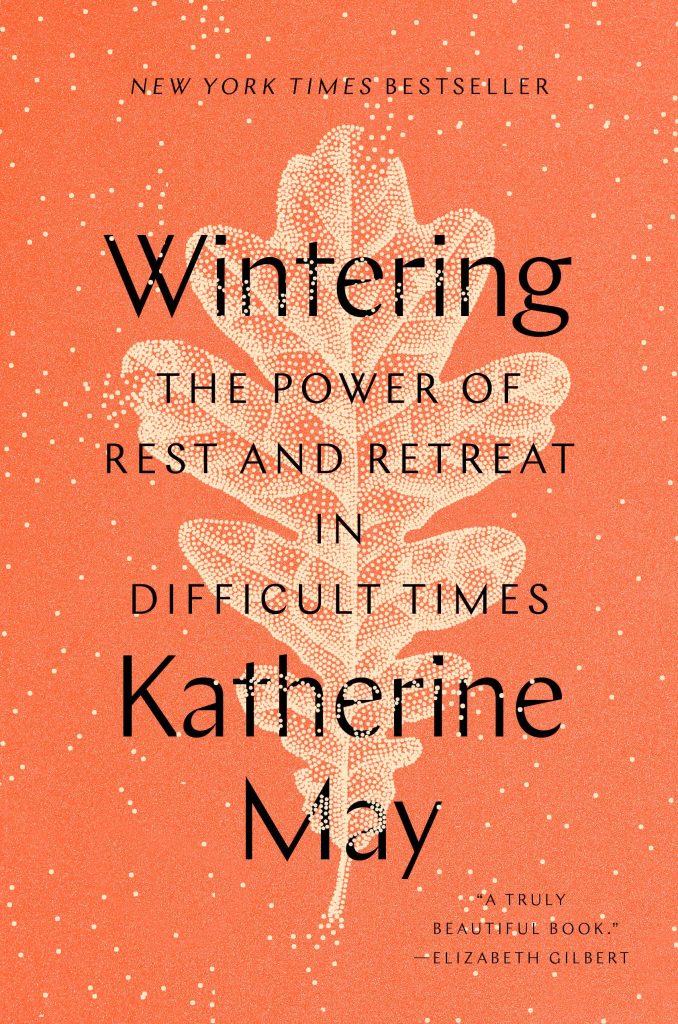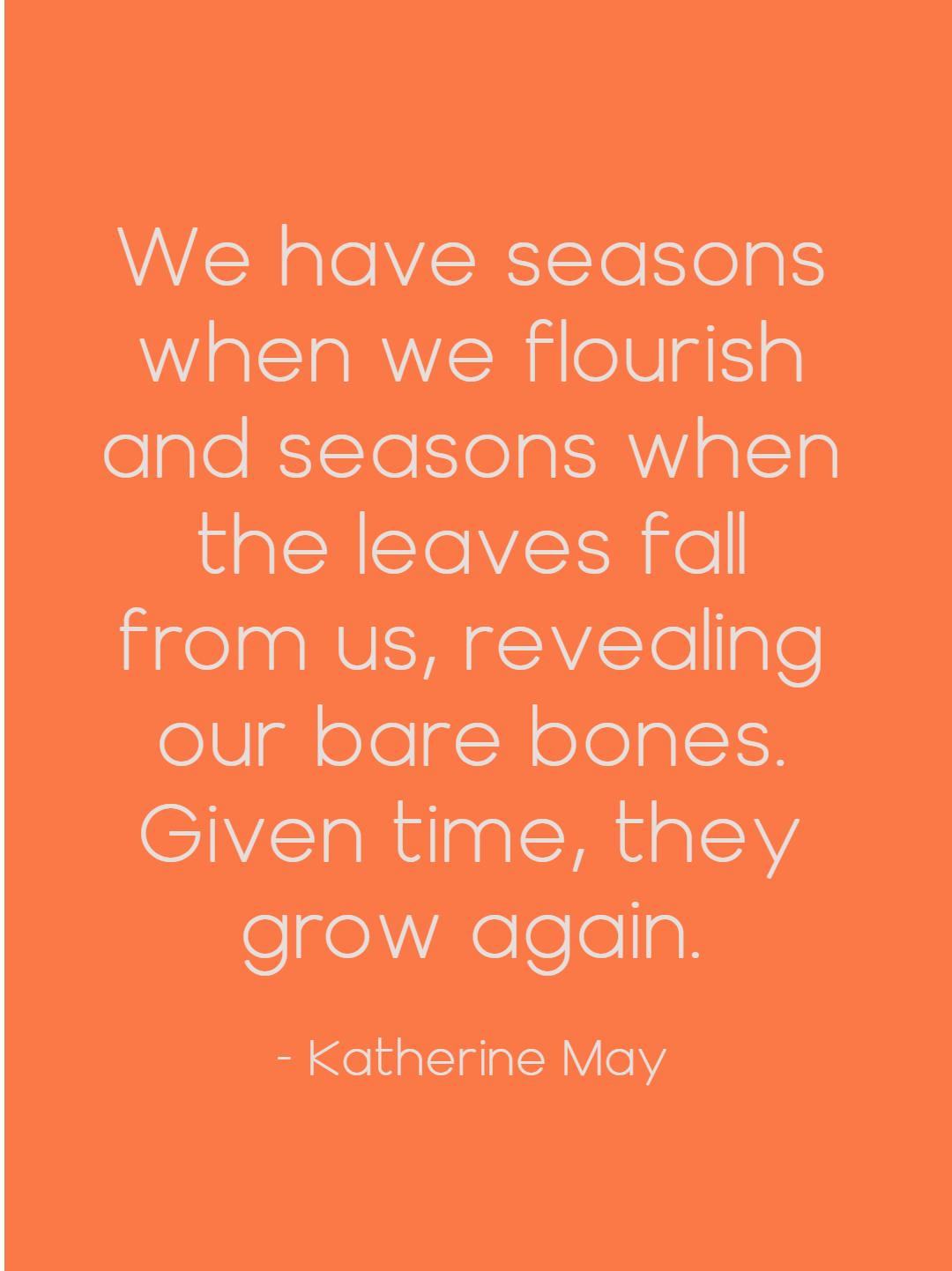Post-holiday season, it’s tempting to let the winter blues get the best of us. Particularly in the wake of yet another covid winter and yet another sombre New Years. There’s something particularly, poignantly sad about canceling the celebration of a new year, isn’t there? Before the holiday season began, as the days got darker and the weather grew colder, I checked out the audiobook of Wintering: The Power of Rest and Retreat in Difficult Times by British writer Katherine May. I listened to it as I walked through a wooded path after the first snowfall of the season.
The UK focus of the book did give me pause, I admit. “Oh, my sweet summer child,” I thought, quoting Old Nan, “what do you know about winter?” But May’s concept of “wintering” transcends the season itself and is also applied to the dark, low “winter” periods of life. Just as winter is an annual, perhaps unwelcome visitor, so too are these low periods. Wintering was written before the pandemic hit, but its timing could not have been better. Published in December 2020, the ongoing pandemic has given the book a striking relevance that May could not have anticipated while writing it.
May’s quest to learn the wintering habits of cultures with harsher climates than that of mild England takes her to neighbouring Nordic countries like Iceland, Norway, and Finland. Countries whose people, while far from rejoicing in the waning light, have found ways to embrace the darkness (the Danes introduced us to the concept of hygge, after all). There are passages dedicated to Christmastime rituals like Sweden’s candlelit Sankta Lucia ceremony, as well as neo-Paganistic rituals closer to home like the Druid celebrations at Stonehenge, ringing in the new year by watching the sun rise over the ancient monument. The chapters are structured according to the calendar, from October to March, with subheadings such as “Metamorphosis”, “Midwinter”, “Epiphany”, and “Thaw” as guideposts. Throughout these chapters, May discusses sometimes her own personal crises (how should one adequately prepare for recurring bouts of depression?) while also taking meandering dips into nature writing, looking to the life cycles of beehives and the hibernation habits of adorable, disappearing dormice for inspiration on how to handle the ups and inevitable downs of our own lives.
What Wintering returns to again and again is the importance of acceptance—something I know we all struggle with. Winter comes each year, and yet each year we act baffled by it. We rage against the falling snow. We push against it as though, with enough willpower, we can overcome it. In one segment of the book, a Finnish friend of May’s mocks the British tendency to willfully ignore the cold weather, opting to dress as though it’s summer. Shamefully, I recalled my own idiotic memories of walking to nightclubs in the dead of February, in short dresses and no stockings, gingerly stepping over snow mounds in high heels, wondering if this was the time I finally got frostbite. Now, I have to ask: to what end?!
I saw a tweet back in November that simply stated, “Just a gentle reminder that it is a natural human rhythm to slow down when the weather turns colder and the nights are long. If you’re struggling to keep pace right now, you’re not lazy or a failure—you’re just a person.” The tweet’s author, Kate DePalma, had been researching harvest traditions at the time of posting. May’s writing, similarly, takes us to a past before electricity, when the dark hours were dark, and life’s rhythm revolved around the sun. What was there to do when the sun set, and there was no TV to watch? Well, there was sleep, and, in a fascinating exploration of alternate sleep patterns, there was also visiting friends in the middle of the night! But one thing there was not: productivity.
Those of us lucky enough to work from home through the coldest months might have noticed a positive shift in our perception of winter and its often-damaging effects on our mental health. Without the need to leave our toasty homes for a dark, miserable, slushy commute, a snowy morning could suddenly be beautiful—peaceful, even. Something I had always suspected was finally confirmed: winter isn’t the problem; our lifestyles are. It’s the constant, unsustainable chase of productivity. It’s the insistence on happiness and cheeriness and go, go, go—toxic positivity at its finest. As May writes, we are “endlessly cheerleading ourselves into positivity while erasing the dirty underside of real life…The subtext of these messages is clear: Misery is not an option.” For some, winter and misery might go hand in hand, and so too does the urge to fend them off. But when have we ever successfully fended off winter? And doesn’t that failure just lead to more misery? What if, rather than sticking our heads in the sand, we dealt with winter—and, in turn, our own negative emotions—as they are?
Of course, it’s almost impossible to read a book like Wintering without a bit of bitterness—that old chip on the shoulder that says “sure, this works for you, but what about me?” Who among us can just decide to take a leave from work to manage depression? Who can just take off to Iceland at the drop of a hat for some healing baths in the Blue Lagoon? May writes from a position of privilege—but it’s important to note that she is not saying “this is what you should do”, but rather “this is what I did”. In an ideal world, we would be able to take leaves from work to manage crippling mental illnesses like depression, and May’s personal experience supports the argument for this shift in corporate thinking. (Also, as a Brit, I’m sure it’s rather easy for May to just pop over to Iceland—it’s, like, a three-hour flight).
For more of Katherine May’s work on wintering, check out her Wintering Sessions podcast, which features thoughtful discussions by guests on their own “literal and metaphorical dark seasons”. Sumayyah’s blog post on “The Art of Getting Cozy” serves up some more winter inspo. If you or someone you know is a senior looking to get the most out of winter, check out VPL’s Golden Age Social Hour: Escape the Winter program!



Imagine if everyone could afford to take leave to deal with (seasonal) depression? What a world that would be!
I think I might be a bit of a minority but I love the snow and do enjoy the cold! As in being out and about and lying down in the snow until a concerned passerby asks if I’m ok. (This came as a surprise to me, as it hadn’t crossed my mind that anyone would be proactive enough to not let me possibly just freeze. I guess there’s still light in the world?) At the same time, I have found myself coming to the sad realization these past few years that maybe I don’t love the cold and the dark as much as I’ve always remembered (or as much as I like to think I do? has it been a delusion all this time, or is it a change of heart? misremembering so I can head into winter thinking it’ll be better? it’s never better – it really only gets worse), so maybe I lied about liking the snow and cold after all. Coming to terms with the fact that not being productive is actually fine, not even just in the dead of winter when I’d rather be as alive as the trees outside, but all year round, is quite the struggle for me, not so much on an intellectual level – I do think it true we shouldn’t expect to be productive all the time and that it’s healthy to not expect we can do so – but more on the level of true belief. Maybe I’ll believe it more in the summertime, when I’m more productive (? Am I though?) and don’t have to experience the reality of what believing it would mean I have to accept?
P.S. I have so much respect for you who has braved FEBRUARY in short dresses, no stockings, and high heels in the grossness that is slush. Like not even the milder start of winter, but truly in the thick of it.
Just make sure you’re not falling asleep in the snow and you’ll be fine! I’ve had the same conundrum lately re: whether I like the cold or not. I’ve always been a winter person, but as I’ve gotten older the lack of sun has started to affect me more. And also it just goes on TOO LONG (I’ll never forget going to France in April one year. It was gorgeous and sunny and warm enough to have picnics. Returned to a blizzard in Toronto. That just about broke me). I now have to consciously remind myself that I like winter, otherwise it’s easy to slip into seasonal depression lol.
You bring up a good question: are we more productive in summer?? I think no. Summer is for lying in the sun with iced refreshments. Maybe we need to hibernate in winter and siesta in the summer and save all our productiveness for spring and fall! Haha.
Also, the first time I wore pants and flat shoes on a winter’s night out was a revelation. I will not be going back to dresses lol.
LOL Toronto really just went, “oh did you forget about me?”
To be quite honest, I’m not a huge fan of spring since it’s just mucky and wet outside, so I feel like my productivity there is also questionable. Maybe… we should just give up on being productive at any time of year. Like, if you are productive, great, if you’re not, there’s no quota you have to live up to in order to feel like you’re living passably as a person in this world and not just a flaming dumpster fire of a human being. Productivity’s not the be all and end all, right? I say this, but you know I don’t believe any of what I’m saying right now.
It’s funny, because I almost always default to dresses in the winter! This might be a bold claim with nothing to back it up apart from my own experience, possibly a delusion, but as a habitual wool stockings & warm leggings wearer during the winter months, I find them to actually feel warmer than if I wore pants!
“Without the need to leave our toasty homes for a dark, miserable, slushy commute, a snowy morning could suddenly be beautiful—peaceful, even.” Agreed! Whenever I have time to just *be* in the moment and engage with life the way I want to rather than *have* to, life is suddenly…well, not easier, but more palatable? Perhaps? Something about going at one’s own pace, with one’s own approach.
That tweet you mentioned really struck a chord with me too–I remember reading somewhere that creativity & productivity should operate like crop rotations, where there has to be a time of dormancy in order for there to be sustainability. I.e., mismanage the land and risk depleting the soil of nutrients. Our brains are similar: if we don’t allow for periods of rest and dormancy, we’ll find we’re blocked or burnt out!
Also, kudos for suggesting the podcast, I can’t wait to check it out!
I love the comparison to crop rotation! I think too often we forget that we’re technically animals–we are part of nature. Why shouldn’t we change along with the seasons, like literally all other living things?! This sort of thinking would drastically reduce the guilt we feel around rest. And calling it a period of “dormancy” makes it sound quaint and cozy!
I hope you enjoy the podcast! It covers a wide range of subjects.